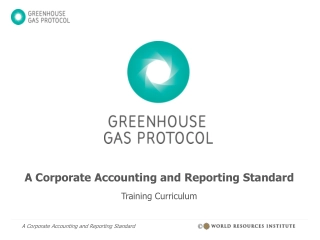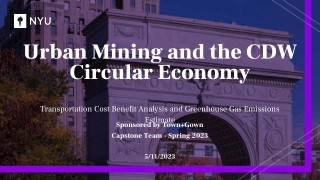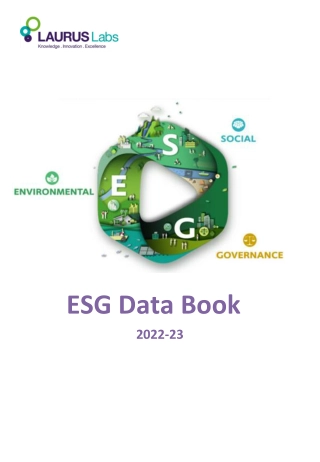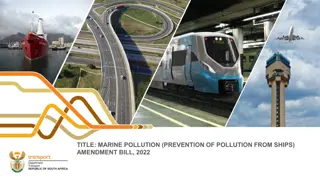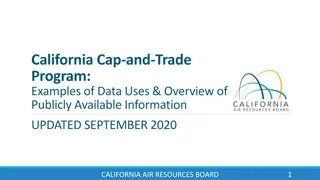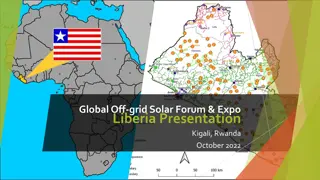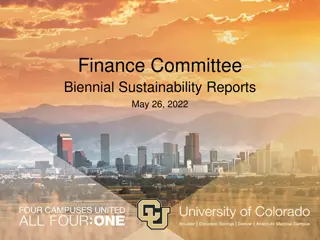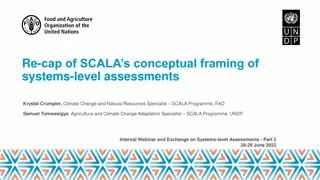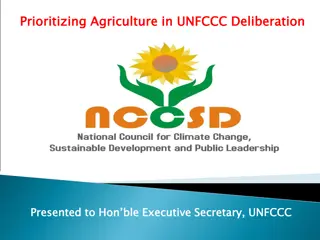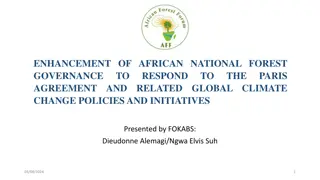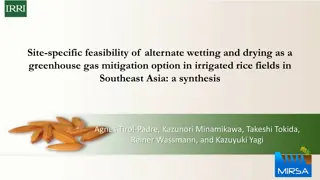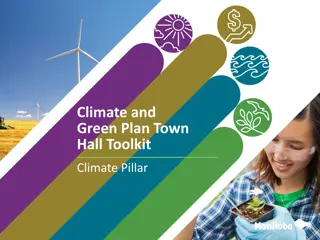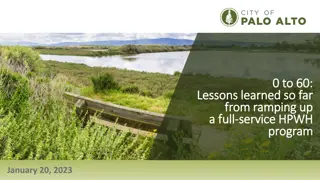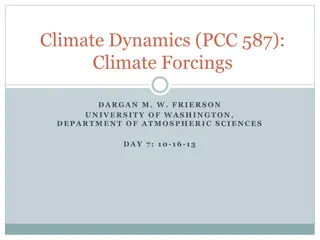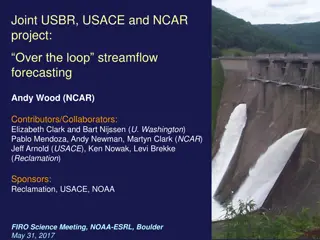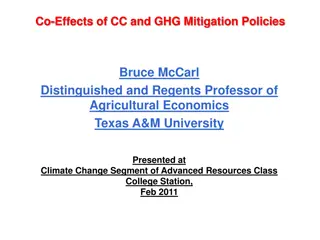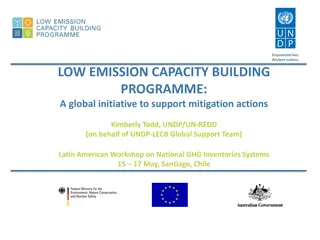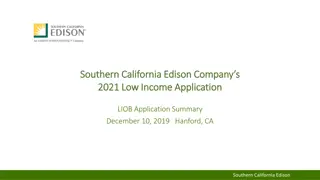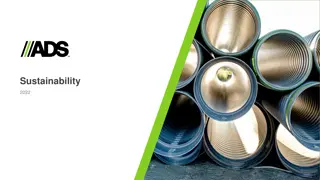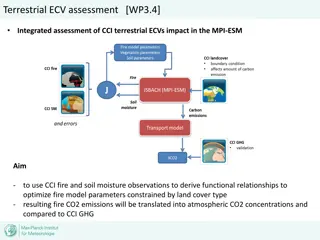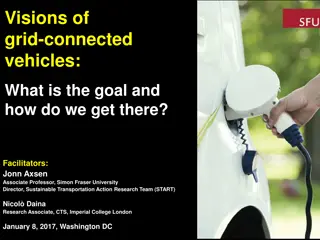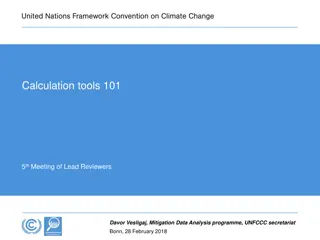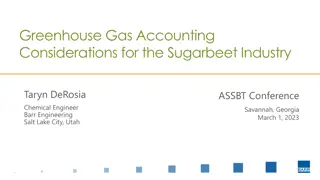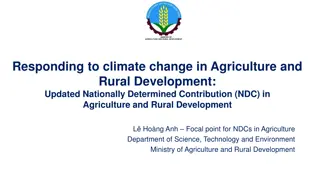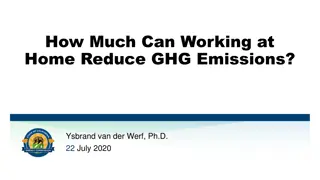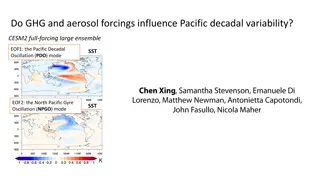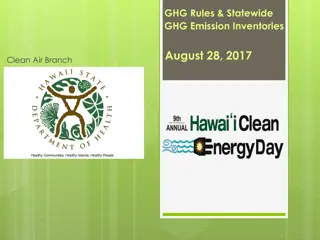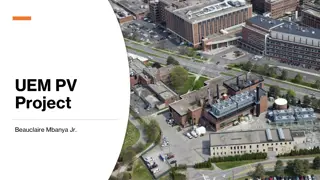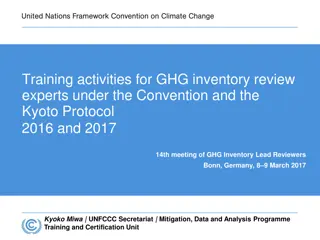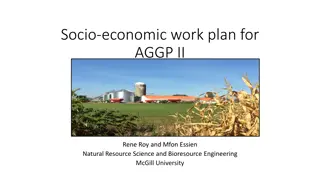A Corporate Accounting and Reporting Standard
This standard covers corporate accounting and reporting principles, tracking emissions over time, calculating emissions, and reporting GHG emissions.
2 views • 18 slides
A Corporate Accounting And Reporting Standard
Principles and guidelines for preparing GHG emissions inventories, focusing on organizational boundaries, operational boundaries, tracking emissions over time, calculating emissions, and reporting GHG emissions. It emphasizes relevance, completeness, consistency, transparency, and accuracy in accoun
1 views • 14 slides
A Corporate Accounting and Reporting Standard
This training curriculum covers principles of GHG accounting, organizational boundaries, setting operational boundaries, tracking emissions over time, calculating emissions, and reporting GHG emissions. It emphasizes the importance of determining which company operations and emissions sources to inc
2 views • 25 slides
Urban Mining and CDW Circular Economy Cost-Benefit Analysis
This case study focuses on comparing the cost and greenhouse gas emissions savings of local processing and reuse of Construction and Demolition Waste (CDW) materials versus sending them to landfills. By developing a prototype cost and GHG savings calculator, the aim is to showcase the potential of e
0 views • 14 slides
ESG Data Book 2022-23 Performance Report
The ESG Data Book 2022-23 provides detailed information on environmental, social, and governance performance indicators, including water withdrawal, energy consumption, GHG emissions, waste generation, materials used, and employee turnover rates. The report highlights key statistics and trends for t
0 views • 13 slides
Workshop on Tracking Progress of the Mitigation Commitments of Nationally Determined Contributions
Workshop on Tracking Progress of the Mitigation Commitments of Nationally Determined Contributions will focus on enhancing transparency frameworks, modalities, procedures, and guidelines related to NDC tracking provisions. It includes detailed information on mitigation policies, actions, and plans o
1 views • 11 slides
Energy Transition and NRE Potential in Indonesia's Path to NZE 2060
Indonesia is focused on transitioning to Net Zero Emissions by 2060, with a significant emphasis on New Renewable Energy (NRE) sources. The country has made strides in increasing NRE utilization, with promising potential in hydro, solar, wind, geothermal, and ocean energy. Additionally, Indonesia is
1 views • 9 slides
Understanding Climate Neutrality and Roadmaps for Achieving it at a University
Exploring the concept of climate neutrality and the development of roadmaps to achieve it at a university, focusing on the efforts of JKU and its Energy Institute towards CO2 reduction and reaching climate neutrality by 2030. The roadmap involves stakeholder engagement, defining system boundaries, u
1 views • 19 slides
Tradeoffs Between Water Savings and GHG Emissions in Irrigated Agriculture
This study examines the tradeoffs between water savings, economic impact, and greenhouse gas emissions resulting from technological changes in the irrigation industry. Key objectives include estimating water savings for different crops, quantifying GHG emissions from new irrigation technologies, and
0 views • 24 slides
Climate Action Strategy for Decarbonising Inland Transport by 2050
The Inland Transport Committee (ITC) has adopted a strategy to reduce greenhouse gas emissions from inland transport, aligning with the goal of achieving net-zero emissions by 2050. This strategy includes a focus on reducing GHG emissions, setting strategic objectives, implementing climate actions,
1 views • 19 slides
Climate Action Roadmap: Building a Sustainable Future
Understanding the urgent need for action on climate change, this presentation by the Dalton Green Committee highlights the impacts of rising global temperatures and the importance of reducing greenhouse gas emissions. Massachusetts' mandated GHG reduction targets for 2025, 2030, 2040, and 2050 are o
0 views • 7 slides
Marine Pollution Prevention Amendment Bill Overview
The Marine Pollution (Prevention of Pollution from Ships) Amendment Bill aims to incorporate MARPOL Annex IV and Annex VI to regulate sewage treatment, reduce marine pollution, and address ship energy efficiency and GHG emissions. The bill seeks to enhance environmental protection by restricting sew
5 views • 15 slides
Publicly Available Data Usage in California's Cap-and-Trade Program
The California Air Resources Board offers publicly available data on the Cap-and-Trade Program, including emissions reports, compliance status, market transparency, and more. Key modules cover reporting regulations, GHG emissions, compliance instruments, industrial allocation, and offset program val
0 views • 43 slides
Socio-economic Overview and Energy Access in Liberia
This presentation provides a comprehensive overview of Liberia's socio-economic landscape, energy access challenges, and climate change targets. It covers key data such as GDP, population, sectoral contributions, access rates, renewable energy targets, and more. The country aims to achieve 100% elec
0 views • 14 slides
Campus Sustainability Initiatives and Community Engagement Overview
Efforts to enhance campus sustainability through strategic planning informed by the Campus Master Plan and State of Colorado Climate Action Plan. Key focus areas include reducing GHG emissions, energy use intensity, and water consumption. Additionally, community engagement initiatives such as CHASE
7 views • 8 slides
Transformative Strategies for Climate Change Adaptation in Food Systems
Evolving theories of transformational change emphasize the importance of transformative actions in addressing climate change impacts on agri-food systems. The IPCC AR6 report highlights the need for system-wide shifts to mitigate GHG emissions and enhance resilience in the face of escalating climate
0 views • 8 slides
Enhancing CO2 Absorption Through Prioritizing Agriculture in UNFCCC Deliberation
COP 24 aims to address the challenges of global warming but faces obstacles in reducing CO2/GHG emissions. Emphasizing agriculture as a key solution due to its CO2 absorption capabilities can lead to breakthroughs. Implementing measures like modern technology in agriculture and promoting initiatives
1 views • 12 slides
Enhancing African National Forest Governance for Climate Agreement Response
The study focuses on enhancing African national forest governance to align with the Paris Agreement and related climate change policies and initiatives. It highlights the importance of forests as GHG sinks and the pressing need for protection and sustainable management. The study aims to generate kn
0 views • 18 slides
Feasibility of Alternate Wetting and Drying as a GHG Mitigation Option in Rice Fields
This synthesis study explores the site-specific feasibility of alternate wetting and drying (AWD) as a greenhouse gas mitigation option in irrigated rice fields in Southeast Asia. The research analyzes the impact of environmental and soil properties on GHG mitigation, evaluates trade-offs and co-ben
1 views • 19 slides
Manitoba's Climate Action Plan: Fostering Clean Energy and Carbon Pricing
Explore Manitoba's comprehensive climate action plan focusing on clean energy initiatives, carbon pricing strategies, and greenhouse gas emission reduction measures. The plan includes actions such as promoting clean energy, implementing carbon pricing, and addressing GHG emissions through innovative
0 views • 16 slides
Lessons Learned and Program Highlights from HPWH Ramping Up
Discover key insights and highlights from the ramp-up of a full-service HPWH program in Palo Alto, including opportunities to reduce GHG emissions, details of the relaunched HPWH program, customer journey insights, and coordination with other city departments.
0 views • 12 slides
Understanding Radiative Forcings in Climate Dynamics
Climate forcings directly impact global temperature by changing solar energy absorption and greenhouse gas concentrations. Shortwave forcings involve changes in solar radiation absorbed, while longwave forcings relate to greenhouse gases affecting the greenhouse effect. Positive radiative forcings l
1 views • 36 slides
Over-the-Loop Streamflow Forecasting Project Summary
Joint project by USBR, USACE, and NCAR focusing on improving streamflow forecasting using automated over-the-loop approaches. Key challenges include model calibration, data assimilation, and real-time forcings. Objectives involve building an automated system for short- to long-term flow predictions
0 views • 41 slides
Understanding Co-Effects of Climate Change and GHG Mitigation Policies
Explore the interplay between climate change and greenhouse gas mitigation policies, including their economic perspectives, measurement methods, and government interventions. Discover how these policies generate externalities and impact various sectors such as agriculture, forestry, and energy. Dive
0 views • 33 slides
City of Bellingham Biosolids Planning Core Team Meeting Summary
The City of Bellingham held a Biosolids Planning Core Team Meeting on June 9, 2017, focusing on back injury prevention and discussing various topics such as offsite assessments, preliminary layouts, Sweet and GHG accounting results, TBL+ criteria, and next steps. The meeting emphasized the importanc
0 views • 27 slides
Global Low Emission Capacity Building Programme Overview
The Low Emission Capacity Building Programme is a global initiative by UNDP aimed at enhancing capacities for designing and implementing Low Emission Development Strategies and national mitigation actions in various sectors. It includes components like GHG inventory management, NAMAs, LEDS, MRV, and
0 views • 12 slides
Southern California Edison Company's Low Income Assistance Programs Summary
Southern California Edison Company's Low Income Assistance Programs aim to further reduce GHG emissions, improve energy efficiency, and enhance energy savings. The programs support vulnerable customers, disadvantaged communities, and job opportunities in low-income areas. Initiatives include offerin
0 views • 9 slides
Effective Rate Design Principles for Achieving California's Green Energy Goals
SCE is restructuring demand charge rates to achieve GHG reduction targets, focusing on fairness, efficiency, stability, and simplicity. Recent changes to legacy rate structures aim to recover costs and integrate Distribution Energy Resources efficiently.
0 views • 9 slides
Sustainable Water Management Solutions and Recycling Innovations by ADS
ADS is committed to protecting water resources and the environment through innovative water management solutions and industry-leading recycling practices. With a focus on sustainability, ADS recycles over 600 million pounds of plastic annually, contributing to a better future for our planet. Their e
0 views • 8 slides
Integrated Assessment of Terrestrial ECV Impact in MPI-ESM
Utilizing CCI fire and soil moisture observations to optimize fire model parameters in MPI-ESM. The study focuses on deriving functional relationships to enhance accuracy in predicting fire CO2 emissions and their impact on atmospheric CO2 concentrations compared to CCI GHG data. JSBACH-SPITFIRE fir
0 views • 7 slides
Workshop on Vision of Grid-Connected Vehicles and Vehicle-Grid Integration
This workshop, led by Jonn Axsen and Nicol Daina, explores the visions and strategies for grid-connected vehicles and vehicle-grid integration. It delves into the benefits, risks, societal implications, and policy requirements of various VGI visions. Experts discuss consumer perceptions, business pr
0 views • 24 slides
Overview of Calculation Tools for Mitigation Data Analysis Program under UNFCCC Secretariat
This content discusses various calculation tools used in the Mitigation Data Analysis program of the UNFCCC Secretariat. It includes tools for GHG projections, financial support, and their integration into Country briefs to facilitate accurate data presentation and reduce workload during reviews. De
0 views • 7 slides
Greenhouse Gas Accounting Considerations for Sugarbeet Industry
Explore the importance of greenhouse gas (GHG) inventories for the sugarbeet industry, including benefits, steps to develop inventories, and the significance of tracking GHG emissions. Learn about key gases impacting climate change and the role of GHG Protocol Organization Accounting Standards. Disc
0 views • 28 slides
Climate Change Response in Agriculture: Vietnam's Updated NDC
Vietnam is making strides in responding to climate change in agriculture and rural development through its updated Nationally Determined Contribution (NDC). The country is committed to implementing measures for GHG emission reduction and climate change adaptation, aligning with the Paris Agreement.
0 views • 20 slides
Potential Reduction of GHG Emissions by Working at Home
This analysis explores the impact of increased remote work on reducing greenhouse gas emissions, particularly in the context of the COVID-19 lockdown. By examining workforce data, commuting patterns, and emission statistics in California, the study aims to quantify the potential decrease in GHG emis
0 views • 15 slides
Influence of GHG and Aerosol Forcings on Pacific Decadal Variability in CESM2
The study investigates how greenhouse gas (GHG) and aerosol forcings impact Pacific decadal variability (PDV) through the analysis of CESM2 full-forcing large ensemble data. It explores the influence on the Pacific Decadal Oscillation (PDO) and North Pacific Gyre Oscillation (NPGO) modes, long-term
0 views • 5 slides
Hawaii Statewide Greenhouse Gas Emission Rules Overview
The Hawaii Statewide Greenhouse Gas (GHG) Emission Rules implemented by Act 234 in 2007 aim to limit statewide GHG emissions to 1990 levels by 2020. The rules include setting emission caps for stationary sources, conducting annual evaluations to track progress, and reporting GHG inventories regularl
0 views • 9 slides
Renewable Energy Analysis & GHG Emissions Reduction in NY & Solar Rooftop Potential
Explore the analysis of renewable energy projects like UEM.PV Project Beauclaire Mbanya Jr. and New York State Energy Portfolio, alongside Solar Rooftop Potential and GHG Emissions Reduction initiatives. Discover insights on solar energy generation, system size, cost, efficiency, and rooftop space u
0 views • 13 slides
GHG Inventory Review Training Activities 2016-2017
Training activities for GHG inventory review experts under the Convention and the Kyoto Protocol conducted in 2016 and 2017, including basic courses, exams for new experts, refresher seminars, and updates on KP courses. The activities aimed to enhance expertise in reviewing greenhouse gas inventorie
0 views • 13 slides
Sustainable Agricultural Practices and Technology Transfer Plan
The Socio-Economic Work Plan for AGGP II focuses on the partial budgeting of beneficial management practices related to water management systems, GHG mitigation, and adaptation. It aims to identify co-benefits, assess socio-economic factors affecting water demand and climate change, develop a region
0 views • 19 slides


